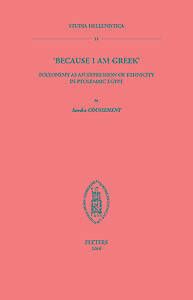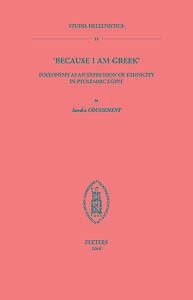
- Retrait gratuit dans votre magasin Club
- 7.000.000 titres dans notre catalogue
- Payer en toute sécurité
- Toujours un magasin près de chez vous
- Retrait gratuit dans votre magasin Club
- 7.000.000 titres dans notre catalogue
- Payer en toute sécurité
- Toujours un magasin près de chez vous
98,00 €
+ 196 points
Description
Double names have a long history in Egypt. They are already attested on Old Kingdom funerary monuments, where concern about eternal life required a correct identification of the deceased. When Greek and Egyptian cultures came into contact under the Ptolemies, bilingual polyonymy (i.e. the combination of an Egyptian and a Greek name) became more popular. During this period, Greek ethnicity was valued as a symbol of power and social status, and was used to create borders between the rulers and the ruled. At the same time, however, it was a flexible concept and this made it a useful tool for crossing the very same boundaries it constructed. As ethnicity became a crucial aspect of one's identity, it is not surprising that bilingual polyonymy was well attested among those that formed a bridge between the ruling class and the Egyptian population: particularly military, administrative and priestly officials. Since they moved between largely separated ethnic contexts, combining names of different linguistic origins was a way to negotiate their ethnic identities. Rather than serving as a reliable source for ethnic origin, names can therefore be interpreted as an expression of the ethnic identity of an individual in a certain space or context.
Spécifications
Parties prenantes
- Auteur(s) :
- Editeur:
Contenu
- Nombre de pages :
- 449
- Langue:
- Anglais
- Collection :
- Tome:
- n° 55
Caractéristiques
- EAN:
- 9789042932722
- Date de parution :
- 29-02-16
- Format:
- Livre broché
- Format numérique:
- Trade paperback (VS)
- Dimensions :
- 155 mm x 239 mm
- Poids :
- 662 g







